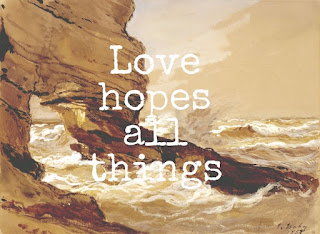Day 12: Love Hopes All Things
P
reviously we pondered the word “believe” in 1 Corinthians 13:7–a translation from the Greek verb πιστεύει (pisteuei) meaning “to have faith, to entrust” (Strong's Greek 4100). Within the same verse seven is the word “hope”—from the Greek verb ἐλπίζει (elpizei) meaning “to hope, hope for, expect, trust” (Strong's Greek 1679). Seemingly at first glance we see not much of a difference when one says ‘love believes’ and ‘love hopes’. However, let us look at three different ways of nuancing believing and hoping.
I. First way is to see with an eye to the present (current or on going) when one says 'I believe in you'. The usual remark "Unbelievable!" could be positive or negative to acknowledge how something has gone beyond or below what is anticipated. However, seeing with an eye to the future (near future or long-term) is different, e.g., 'I have hope in you' is giving to another person some assurance while continuing along a particular journey, race or course of action. Pope Francis said "[Hope] is the anchor (Cf Hebrews 6:19 image of hope as the "anchor for our soul") you toss into the future and can pull on to reach what you wish to attain. It's making an effort in the right direction" (Pope Francis, His Life in His Own Words, Conversations with Jorge Bergoglio by Francesca Ambrogetti and Sergio Rubin, p. 230).
II. Second way of nuancing is this. When you say to another ‘I believe in you’ or ‘I have faith in you’, usually, you look to the other person’s current capability and give direct assurance, support, confidence or sense of certainty basing on a given knowledge of the person’s God-given capability. Pope Francis reflects on what occurred in the last century and he says,
I believe in man. I'm not saying man is good or bad, just that I believe in man, in the dignity and greatness of the person. Life poses questions and we put our principles into practice, or not... because sometimes we get caught up in circumstances and succumb to our weaknesses. The twentieth century was fantastic in many ways, and dreadful in others. But are we better off now or worse? If we look at history, we can see it has ups and downs..." (Ibid, pp. 220-221).
But when you say ‘I hope in you’ in this second way, you look beyond to the other person’s future, e.g., the person's coping ability or cope-ability in dealing with problems in life. ‘I hope in you’ means that no matter what comes we will stand by each other through thick and thin without giving up, even when we see one another fall and fall hard. There is no room for judgements or opinions especially those that are hardened or resistant to change–condemnatory ideas. One gives the other the benefit of the doubt until the end, which makes room for forgiveness and compassion. To say 'I hope in you' is to recognize that potential to change for the better given the necessary help. When there is failure to 'hope all things' it can lead to condemning either oneself or fellow human beings thinking that there is no more chance of being redeemed by God.
III. The third way of nuancing the two is by looking ‘from within’ when we ‘believe all things’ and ‘from without’ when we ‘hope all things’. ‘Believe all things’ could mean that I have been entrusted with the necessary tools by the Creator. Hence, I look within me for the good things that were given to me. One example is the grace of human freedom. God risked big, yes, because I could possibly use my freedom to renounce God. However by granting me human freedom, God has elevated me and made me his trusted partner who is always believed to be capable of using my freedom to do the good for myself and for others.
To ‘hope all things’, the third way, is like looking ‘from without’. It is to hope for something that cannot come from my own efforts alone, hence, I can truly hope for or expect from outside of me. This is where hope is differentiated from sheer optimism. Pope Francis said "one should not confuse optimism with hope. Optimism is a psychological attitude toward life. Hope goes further than that... God is involved." To make certain the optimist's future one only needs personal discipline, consistency, hard work, accuracy of plan and standard execution. But all these are like structures built on 'sand' or on shaky ground.
Featured song for our consideration is James Arthur's "Say You Won't Let Go."
Fr JM Manzano SJ


An inspiration...
ReplyDeleteThe message of hope started a meaningful journey
Amidst seemingly impossibilities
But hope keeps it going
For God is within and around
Life goes on eagerly waiting
Till the moment be
Saying “At home at last!”
Thanks for this wonderful reflection, Fr. Jom! Happy Chinese New Year! : )
Thanks much for this beautiful piece you have written! G.K. Chesterton said, “As long as matters are really hopeful, hope is a mere flattery or platitude. It is only when everything is hopeless that hope begins to be a strength.” GBU!
DeleteWell- chosen song ,Fr. Jom! …. An endearing song every beloved would love to listen…and surely the answer…to hold on not only until death do us part…but for eternity.. A love that hopes all things… Thanks and GBU! : )
ReplyDeleteIndeed, love's power is mostly found in the hoping... and the love of two individuals can be a powerful too and eternally full of hope! GBU!
Delete